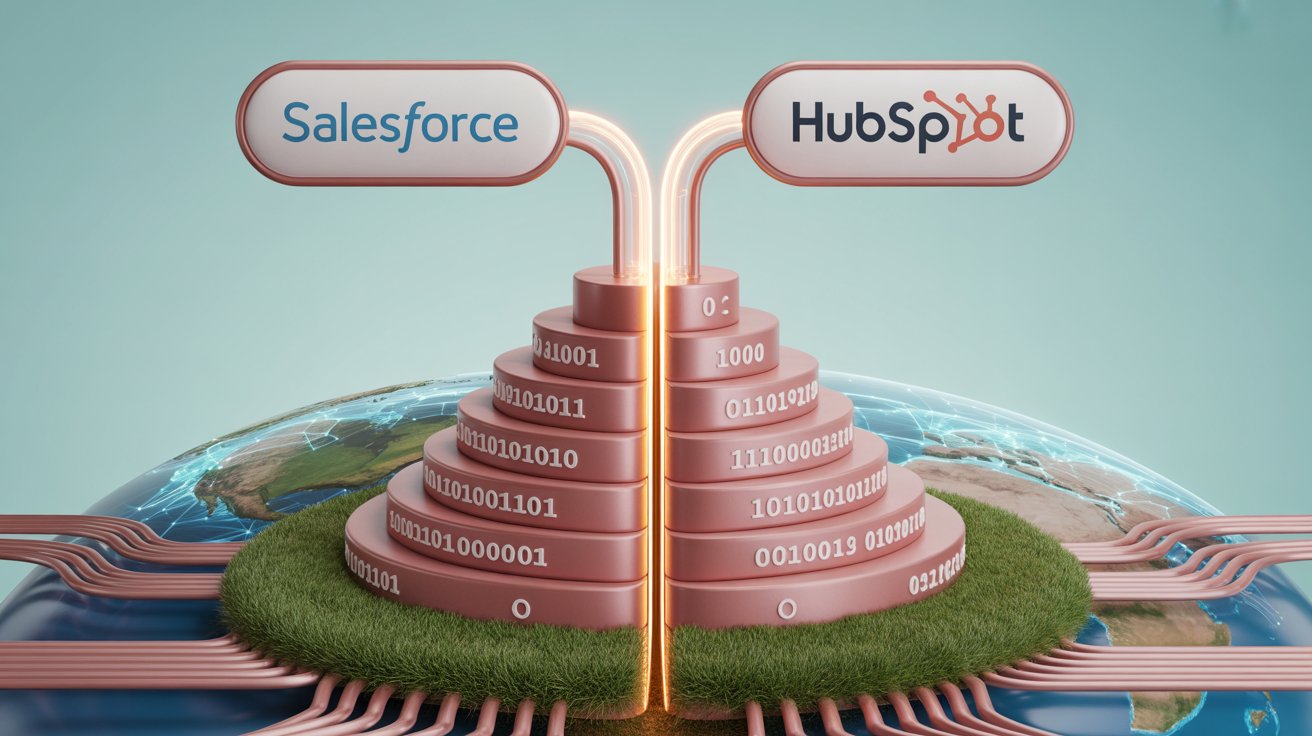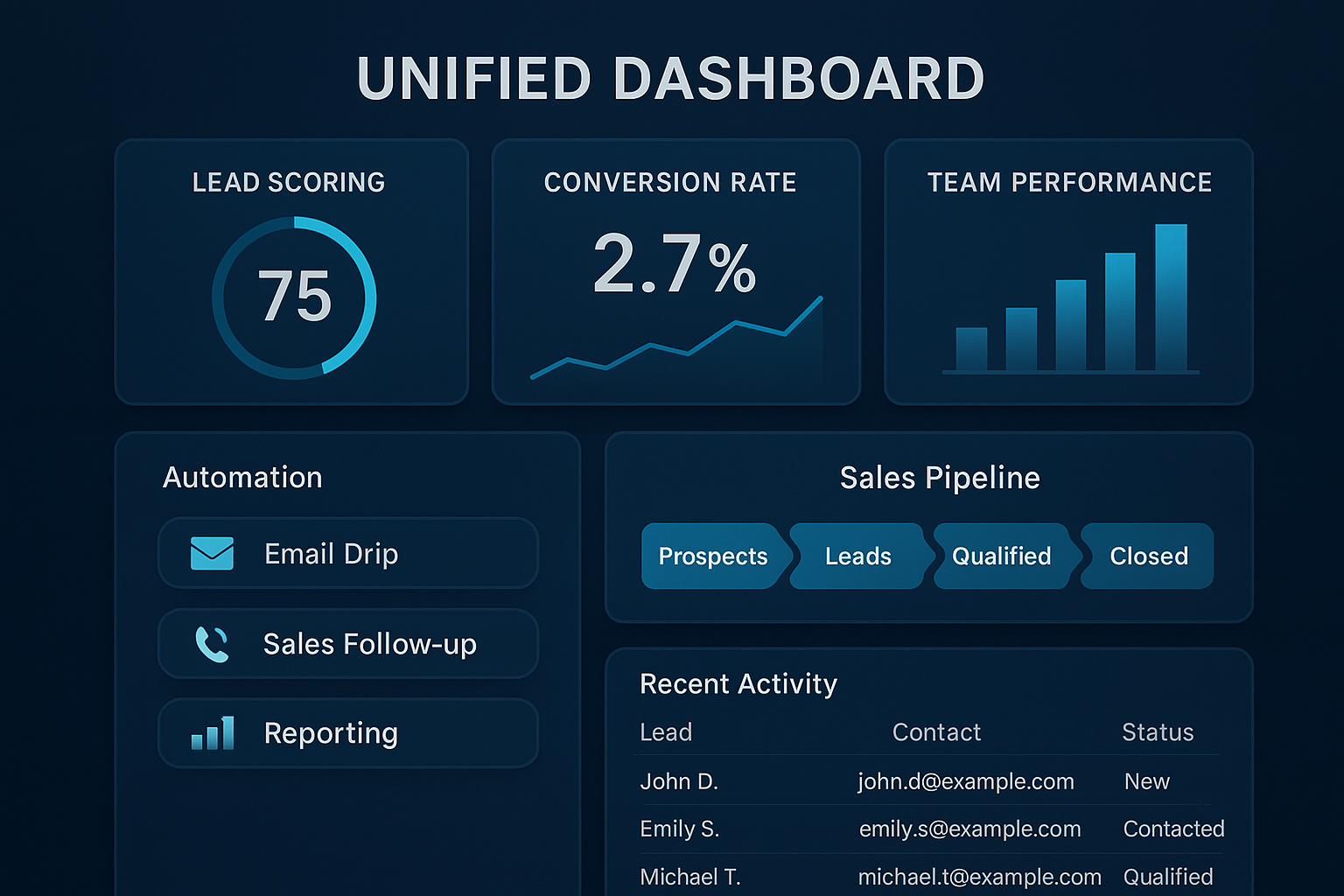

Integrating Salesforce and HubSpot for Multi-Level Marketing (MLM) creates a powerful, end-to-end solution that unifies marketing automation with advanced sales management. While HubSpot streamlines lead generation, email campaigns, and prospect nurturing, Salesforce delivers robust CRM capabilities, performance tracking, and distributor management. Together, these platforms eliminate data silos, automate repetitive tasks, and provide MLM businesses with real-time insights that drive recruitment, retention, and growth at every level of the organization.
The multi-level marketing industry stands at a technological crossroads, where sophisticated CRM integration has evolved from operational convenience to competitive necessity. As the global MLM software market surges from $600 million in 2024 to a projected $1.26 billion by 2031—representing a robust **9.97% CAGR**—platforms are increasingly turning to advanced Salesforce and HubSpot integrations to manage complex distributor hierarchies, automate commission calculations, and maintain regulatory compliance in an evolving landscape.

The convergence of expanding market opportunities and technological advancement creates compelling business cases for MLM-CRM integration. The global customer relationship management (CRM) market, valued at $101.41 billion in 2024, is projected to reach $262.74 billion by 2032, growing at **12.8% CAGR**.
Simultaneously, the direct selling market continues its upward trajectory from $223.82 billion in 2024 to an anticipated **$328.26 billion by 2030**, driven by rising consumer demand for product validation and personalized shopping experiences.
This growth trajectory intersects with critical operational challenges. Companies utilizing integrated CRM systems report a **29% increase in sales productivity**, while organizations implementing AI-powered CRM solutions anticipate outperforming traditional systems by **30% versus 20%** respectively. (Moldstud) For MLM platforms managing thousands of distributors across multiple compensation tiers, these productivity gains translate directly to competitive advantage.
Modern MLM-Salesforce integration relies heavily on API-led connectivity patterns, structured across three distinct layers: System APIs for direct platform connections, Process APIs for business logic orchestration, and Experience APIs for user-facing applications. This architectural approach enables real-time synchronization of distributor data, commission calculations, and performance metrics across platforms.
The most sophisticated implementations leverage MuleSoft Anypoint Platform for enterprise-grade orchestration, providing batch processing capabilities for large distributor networks, event-driven synchronization for real-time updates, and scatter-gather patterns for complex data aggregation scenarios. (Nttdata) Organizations following these patterns report **78% faster project delivery** and reduced integration maintenance overhead. (Integrate)
HubSpot’s Operations Hub introduces custom-coded workflow actions that enable MLM platforms to implement specialized business logic directly within the CRM environment. These JavaScript-based automations running in Node.js 12.x runtime environments support complex genealogy tracking, automated commission calculations, and distributor performance monitoring without requiring external middleware.
Custom objects and associations within HubSpot provide the foundation for modeling MLM hierarchical structures, enabling platforms to represent sponsor-downline relationships, track multi-level commission flows, and maintain audit trails for regulatory compliance. The MW Components case study demonstrates measurable outcomes: a **5% reduction in data management tasks**, 360-degree customer journey visibility, and improved closed-loop reporting capabilities.
Enterprise organizations implementing comprehensive Salesforce-HubSpot integration report exceptional financial returns. Forrester’s Total Economic Impact study documents **299% average ROI over three years** for organizations with $500M+ annual revenue, while MuleSoft implementations achieve proven **445% ROI** when API reuse is maximized. (Integrate) These performance indicators reflect the compound benefits of reduced manual processes, improved data accuracy, and accelerated decision-making capabilities.
Key performance benchmarks include:
The regulatory landscape increasingly demands sophisticated compliance capabilities. Organizations must navigate GDPR and CCPA requirements for data protection, FTC earnings-claim substantiation rules, and emerging EU Digital Services Act content moderation requirements. (Mlm-Cc) Advanced Salesforce-HubSpot integrations address these challenges through automated audit trail generation, real-time compliance monitoring, and intelligent content filtering.
Blockchain integration emerges as a critical component for establishing trust and transparency in commission payments and distributor activities. Companies implementing blockchain-powered MLM transactions report enhanced credibility and reduced compliance overhead.
The transition toward AI-driven MLM operations accelerates as **81% of organizations anticipate implementing AI-powered CRM systems by 2025**, up from 65% in 2024. (Tekrevol) Advanced integration scenarios incorporate natural language processing for intelligent chatbot responses, machine learning algorithms for predictive lead scoring, and computer vision technology for immersive product demonstrations.
Generative AI applications within MLM-CRM integration include automated content creation for distributor training materials, personalized compensation plan explanations, and intelligent prospect engagement strategies. The generative AI market’s projected **46.47% annual growth rate through 2030** underscores the strategic importance of early adoption.
Modern MLM platforms must accommodate evolving distributor preferences for social selling and mobile-first operations. Integration scenarios increasingly incorporate TikTok Shop, Instagram Checkout, and Facebook Live commerce capabilities directly within CRM workflows. This social commerce surge drives double-digit growth while creating new challenges for organic reach and customer acquisition costs.
The MLM-CRM integration landscape through 2030 will be characterized by continued consolidation among leading vendors, increased regulatory compliance requirements, and accelerating adoption of AI-driven automation. Asia-Pacific markets, representing **45.4% of current market share with 7.3% CAGR growth**, will drive significant innovation in mobile-first integration approaches and social commerce capabilities.
Successful MLM platforms will distinguish themselves through **compliance-first integration strategies**, data-driven personalization capabilities, and agile adoption of emerging technologies. Organizations that proactively implement these advanced Salesforce-HubSpot integration scenarios position themselves to capitalize on the expanding **$328 billion** direct selling opportunity while maintaining competitive differentiation in an increasingly sophisticated marketplace.
The convergence of market growth, technological advancement, and regulatory evolution creates unprecedented opportunities for MLM platforms willing to invest in sophisticated CRM integration capabilities. **The evidence clearly demonstrates that advanced Salesforce-HubSpot integration transcends operational efficiency—it becomes a strategic imperative for long-term market leadership.
Integrating Salesforce and HubSpot provides a unified view of customer data, streamlines lead management, automates recruitment and follow-ups, and improves reporting accuracy, which is essential for multi-level marketing companies.
Salesforce helps MLM businesses by offering advanced CRM features, sales tracking, performance analytics, and team management tools to monitor distributor and recruit performance across multiple levels.
HubSpot enhances marketing by automating lead generation, nurturing campaigns, and email drip sequences, while Salesforce manages sales, conversions, and team structures. Together, they create an end-to-end MLM business solution.
No, with the right integration tools and APIs, Salesforce and HubSpot can be seamlessly connected. Many third-party integration platforms simplify the process and ensure data flows smoothly between systems.
Automation triggers such as email drip campaigns, sales follow-ups, and performance reporting are especially useful for MLM businesses because they save time and scale distributor engagement.
Read in Detail @